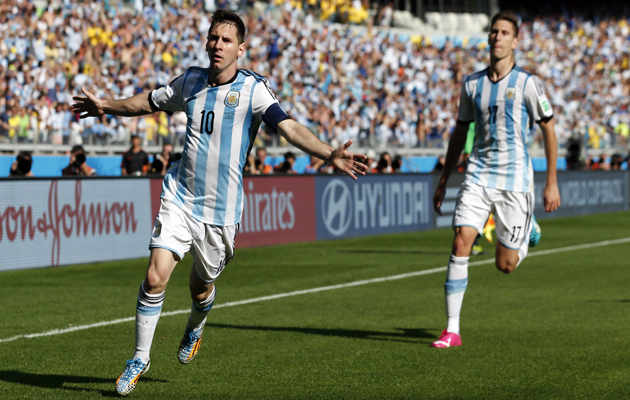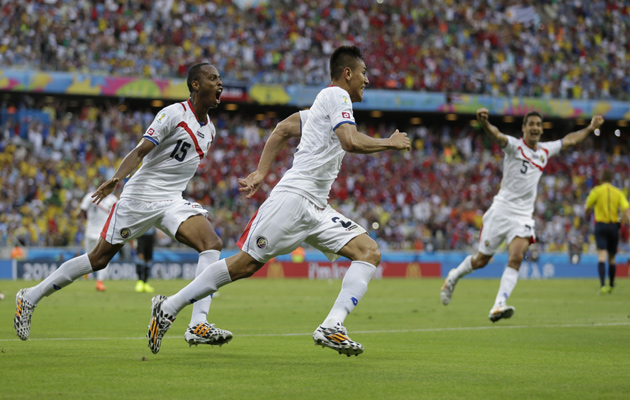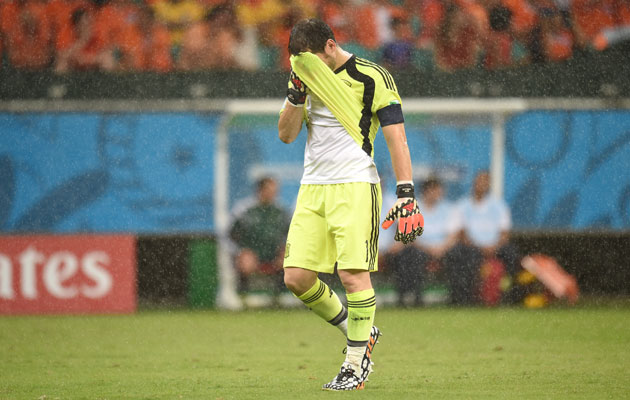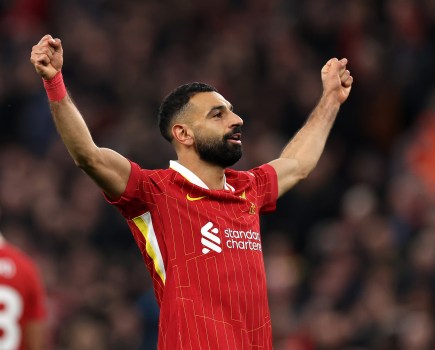1 Don’t write off Europe just yet
It’s been a poor tournament for the European teams, with a number of big nations – notably Italy, England and Portugal – failing to live up to expectations. But the situation is no worse than in 2010, when seven teams also failed to reached the second round. Six European sides remain in the tournament, the same number as in 2010. And four years ago, three of the semi-finalists were European and we had an all-European Final.
2 A disaster for Asian teams
Australia, Iran, Japan and South Korea managed a total of three points from a possible 36. All four finished bottom of their respective groups. Only Australia emerged with any credit, with coach Ange Postecoglu blooding young players in a bold new attacking formation as part of his plan to prioritise preparations for Australia’s hosting of the Asian Cup in the autumn. Japan had performed admirably at the 2013 Confederations Cup, and there were high hopes for South Korea with a team built around the team that won bronze at the 2012 Olympics. But post-mortems are now the order of the day.
3 A great tournament for CONCACAF
The Central and North American region have three teams in the knockout stage for the first time at a World Cup. Honduras failed to rise to the occasion, as expected, but Mexico, Costa Rica and USA all impressed, albeit for different reasons. The geographical proximity has helped, with all three teams backed by large numbers of supporters and Costa Rica, in particular, receiving support from the Brazilians in the stadiums.
4 Attack! Attack! Attack!
The 48 group matches featured 136 goals, an average of 2.83 – way up on 2010 and the best since 1970.
So how to explain the change? A number of factors have been put forward. We’ve had more goalkeeping mistakes (step forward Iker Casillas) and poor defending from set-pieces (Italy’s opener against England). There have also been a lot of early goals, forcing teams into earlier-than-planned changes of formation. The Brazuca ball appears to be a vast improvement on the Jabulani from 2010. Players have more confidence that the Brazuca will not swerve out of control, as the Jabulani did, and can shoot with greater confidence.
The crowds, too, have played their part. Whereas in South Africa, the vuvuzelas provided an intimidating atmosphere at stadiums, spectators in Brazil expect to be entertained. They have applauded attacking play and booed teams when they have not played that way.
5 But not everyone is playing attacking football
Greece reached the second round by scoring just two goals, one a highly debatable penalty. And Brazil, for all the cliches, are playing with one central striker – and not a very good one at that.
6 Different tactical set-ups
South Africa 2010 was dominated by teams playing 4-2-3-1. In Brazil, we have seen many tactical variations. Many are playing 4-3-3 (Argentina), some have deployed a conventional 4-4-2 (Ecuador) while Holland have switched between a 5-3-2 and a 4-3-3. Germany have moved between a false nine (Muller) and a more traditional striker (Klose). Ironically, Brazil are one of the few teams playing with a lone striker.
7 Costa Rica, the biggest surprise
Many assumed Costa Rica would struggle in a group featuring three former World Cup winners, especially after suffering pre-tournament injury setbacks to key players, Bryan Oviedo and Alvaro Saborio. But the Ticos have demonstrated the power of organisation and team spirit. Additionally, they are one of the few remaining teams for whom the World Cup is a transfer shop window. For the likes of Bryan Ruiz and Joel Campbell, the tournament has been an opportunity to remind English observers of their talents. For others such as keeper Kaylor Navos (Levante) and defender Cristian Gamboa (Rosenborg) a move to a bigger European club is now a strong possibility.
8 Algeria, the most improved team of the last four years
Algeria finished bottom of their group four years ago in South Africa, failed to score and picked up a single point, from the feeble draw with England in Cape Town. Four years on and they have qualified for the knockout stage for the first time. A new generation of players, many born and raised in France, has emerged and in Islam Slimani they have found the finisher that previous sides have lacked. French players with Algerian roots, such as Zinedine Zidane, Samir Nasri and Karim Benzema, have eluded Algeria in the past but the national federation’s determination to recruit from the Algerian diaspora is now paying dividends.
9 Algeria, Belgium and Switzerland are a reminder of the changing nature of international football
Just as Algeria have recruited French-raised players with Algerian roots, so Belgium and Switzerland have benefited from immigration. In a previous generation, Belgian players such Marouane Fellaini (Moroccan heritage), Vincent Kompany (Congo) and Adnan Januzaj (Kosovo) would have played international football for their parents’ homeland. Indeed, Romelu Lukaku’s father Roger was capped by Zaire, while Divock Origi’s father played for Kenya. The current generation, born and raised in Belgium, feel more integrated and have opted to play for Belgium.
Similarly, Switzerland would be a much-weakened side without players whose families moved to the country after fleeing the civil war in the former Yugoslavia. Xherdan Shaqiri is just one of a number of the current squad who have backed Kosovo’s campaign to play international matches.
10 FIFA gets something right
With the four-month ban on Luis Suarez for biting Italy’s Giorgio Chiellini, FIFA has surprised even itself by acting in an efficient and upstanding manner, a proper moral guardian of the game. The Telegraph’s Henry Winter even went so far as to describe the punishment as the “best moment in FIFA’s history”.
11 African teams still let down by their administrators
With Nigeria and Algeria reaching the second round, African football is making some progress on the pitch. But the players are still being let down by their administrators. Cameroon’s pre-tournament preparations were disrupted by the now-obligatory row over bonuses and appearance money. Ghana sent home two key players, Kevin-Prince Boateng and Sulley Muntari on the eve of their game against Portugal. Muntari, who was reported to have attacked a federation official, insisted the row was not about money. However, earlier that day three million dollars had been delivered to the team hotel, after the players had insisted on their bonuses being paid in cash.
As Nigeria prepared for their second-round game against France, a training session was cancelled amid reports of a disagreement over payments to players for reaching the knockout stage.
12 End of an era for Spain
When the end came, it was brutal and unforgiving. The humiliation of Spain by Holland in their opening match was the most humbling defeat ever suffered by a defending champion. The defensive deficiencies of Iker Casillas and Sergio Ramos were brutally exposed by Holland’s counter-attacking approach but Spain still have a case to be considered the greatest international side of all time, having been the only team of the modern post-war ere to win three consecutive international titles.
Ultimately, though, great teams are built around great players. Spain had one man in particular who stood out. Xaxi’s decline in fitness and influence was the decisive factor in ending Spain’s reign at the top.
13 Teamwork and spirit is the key to success
As England and Portugal trudge home, a collection of individuals who did not perform as a collective, the tournament is full of examples of teams that were greater than the sum of their parts. USA, Costa Rica and Greece all demonstrated the power of hard work and team spirit. One of the quiet surprises of the tournament have been France. They look to have benefitted from the exclusion of Samir Nasri from the squad and even the absence through injury of star man Franck Ribery may have contributed to a greater sense of collective purpose.
14 Brazil are the Neymar show

Brazil have been far from convincing in their opening games. Defensively they look vulnerable and they face a huge test against Chile in Belo Horizonte tomorrow (Saturday). They have Neymar to thank for continued presence in the tournament – the 22-year-old has single-handedly carried the burden of a nation on his slender shoulders. Brazil’s World Cup-winning sides have always had a reliable goalscorer – Romario in 1994, Ronaldo in 2002. It’s impossible to have the same sense about Fred or Jo. Everything for Brazil rests on Neymar – and so far he is coping admirably – but if anything should happen to him…
15 Argentina are gaining momentum
Argentina began the tournament slowly, with coach Alejandro Sabella fielding a surprise 5-3-2 formation against Bosnia-Herzegovina. The switch to a more familiar 4-3-3 set-up has given Lionel Messi greater freedom to express himself. The introduction of Fernando Gago in midfield has given the midfield a better balance and Argentina have improved with every game, the mark of potential champions.
16 Thomas Muller, the German Inzaghi
While Neymar and Lionel Messi are considered the high-profile contenders for the Golden Boot award, Germany’s Thomas Muller is quietly pursuing his own ambitions on that front, having finished as joint top scorer in 2010.
Muller is not a particularly glamorous player, and often attracts criticism for not being the showman. Yet he is reminiscent of Filippo Inzaghi in the way he relentlessly scores goals by always being in the right place when needed. Muller has now scored nine World Cup goals. He is only 24 years old.
17 Brazil 2014, a vuvuzela-free tournament
The atmosphere in Brazil’s stadium is a vast improvement on 2010, when the tournament was plagued by the vuvuzela. The crowds, particularly when South American teams are playing, have contributed massively to the carnival atmosphere. Chile fans, especially, have brought colour and noise and even refused to take part in a Mexican wave initiated by Dutch fans during Chile’s final group game against Holland. There are limits, even for the best fans of the tournament.
18 Big-coach salaries are no guarantee of success
The three highest-paid coaches at the tournament – Russia’s Fabio Capello, Cesare Prandelli of Italy and England manager Roy Hodgson – were all home before the postcards.
19 The referees should get better
The selection of Japanese official Yuichi Nishimura for the Opening Game in Sao Paulo between Brazil and Croatia proved to be hugely controversial. Brazil has the largest population of Japanese people living outside Japan, with most living in Sao Paulo. So perhaps it was not a surprise that Nishimura gave such a soft penalty against Croatia, who were understandably left fuming, claiming a FIFA conspiracy.
Absurdly, the appointment of Nishimura was taken in part because FIFA did not want to have a European or South American official in charge of such a high-profile game involving teams from those continents.
The knockout stage will see more top-quality referees take charge of games. England’s Howard Webb, Nicola Rizzoli of Italy are available and the choice of officials will widen as other teams depart the competition.
20 England, always England
England were probably the best-prepared team in the tournament, with an army of nutritionists and medical experts backing up Roy Hodgson’s coaching team. But that preparation counts for nothing if you do not have the quality on the pitch.
Hogdson has escaped criticism, largely because of his positive approach to blooding youngsters, particularly in attack. But it is further back that England’s problems lie. The centre-backs were average, while the most crucial position in international football, defensive midfield, has not been filled with any distinction since Owen Hargreaves last played at a World Cup eight years ago.










